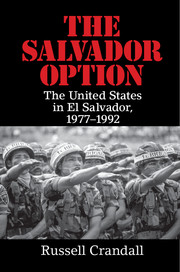Book contents
- Frontmatter
- Dedication
- Epigraph
- Contents
- List of Figures
- List of Organizations
- Acknowledgments
- 1 Introduction
- PART ONE EL SALVADOR IN THE COLD WAR
- PART TWO JIMMY CARTER
- PART THREE RONALD REAGAN
- PART FOUR GEORGE H. W. BUSH
- 39 Elusive Justice
- 40 Pessimism
- 41 Bush Arrives
- 42 Bush, Cristiani, and the 1989 Vote
- 43 Guerrilla Second Final Offensive, November 1989
- 44 Jesuit Killings
- 45 SAMs
- 46 United Nations and Peace
- 47 Demobilization
- PART FIVE POSTWAR
- Notes
- Bibliography
- Index
39 - Elusive Justice
from PART FOUR - GEORGE H. W. BUSH
Published online by Cambridge University Press: 05 June 2016
- Frontmatter
- Dedication
- Epigraph
- Contents
- List of Figures
- List of Organizations
- Acknowledgments
- 1 Introduction
- PART ONE EL SALVADOR IN THE COLD WAR
- PART TWO JIMMY CARTER
- PART THREE RONALD REAGAN
- PART FOUR GEORGE H. W. BUSH
- 39 Elusive Justice
- 40 Pessimism
- 41 Bush Arrives
- 42 Bush, Cristiani, and the 1989 Vote
- 43 Guerrilla Second Final Offensive, November 1989
- 44 Jesuit Killings
- 45 SAMs
- 46 United Nations and Peace
- 47 Demobilization
- PART FIVE POSTWAR
- Notes
- Bibliography
- Index
Summary
It says a lot about El Salvador that a decision to try anyone for murder is news.
– New York Times editorial on the pending trial of five National Guardsmen for the December 1980 killing of the four American churchwomen, November 1982If there is any area where this country [El Salvador] has made zero progress, that's the area of judicial reform and the administration of justice. There ain't no justice here.
– William Walker, U.S. Ambassador, 1989The Other War
U.S. military assistance and advisors were the most controversial expenses of the enormous amounts of aid that Washington was sending to El Salvador in the 1980s. No less significant, however, were the even greater amounts that the United States pumped into the Salvadoran economy. Between 1980 and 1989, economic assistance totaled $2.6 billion. With other sources of foreign financing reluctant to enter the war-torn country, this money was primarily used to reduce the Salvadoran government's enormous debt burdens as well as provide cash reserves to purchase key imports. Another big portion went to development projects to repair infrastructure destroyed by the guerrillas. For instance, according to the Central Bank annual report, repairing the destruction caused by the FMLN offensive that began on November 11, 1989, cost $500 million. The remainder of the economic funds went to cash transfers, food loans, food donations, among other types of assistance.
The major frustration of many U.S. and Salvadoran officials working on these programs was that all of the spending was basically an attempt to return El Salvador to its status before the war began, leaving it still a very poor and underdeveloped country. U.S. money also supported the troubled but massive agrarian reform initiative, which began soon after the 1979 coup that ushered in the reformist junta. Aid also went to education and rural health projects subtly intended to help win the hearts and minds of a traditionally neglected population susceptible to FMLN propaganda and recruitment. The U.S. Agency for International Development (USAID), for example, spent a total of $40 million for the construction and rehabilitation of roughly 1,000 rural classrooms that benefited 70,000 students. More than $70 million was used to aid displaced persons, providing temporary jobs, daily food rations to 200,000 people, and medical visits to 400,000 people.
- Type
- Chapter
- Information
- The Salvador OptionThe United States in El Salvador, 1977–1992, pp. 405 - 408Publisher: Cambridge University PressPrint publication year: 2016



